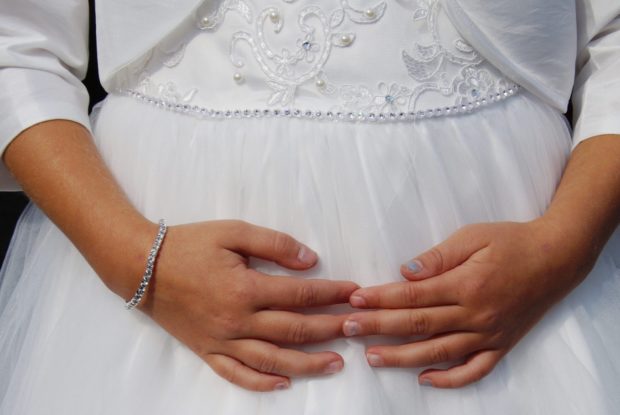Child marriages in BARMM rooted in gender, inequality

Child marraige. (Shutterstock/File)
MANILA, Philippines — Lack of access to quality education, poverty, and limited freedom of young girls to make their own decisions are among the factors that contribute to the prevalence of child marriage in the Bangsamoro Autonomous Region in Muslim Mindanao (Barmm), according to a study by Plan International.
Earlier this year, a law banning child marriages in the country has been passed but many Muslim leaders are urging President Rodrigo Duterte to repeal the law as it was an important part of their culture.
A recent study by Plan International, the Women’s Refugee Commission and Transforming Fragilities found that child marriage in Barmm was rooted in gender and socioeconomic inequality, “which is created and perpetuated by a patriarchal system that promotes harmful gender norms.”
Among these factors are the community expectations that girls and women need to attend to domestic responsibilities, policies that allow child marriage and “patriarchal power dynamics” such as the parents’ eagerness to control the sexuality of the adolescent girls.
Although the researchers did not ask directly about child marriage, they found that one-third of the participants’ stories underscored some aspects of marriage, with almost all of the narratives specific to child marriage.
Article continues after this advertisementBased on their findings, the presence of school buildings in rural communities affected by conflict does not mean that educational resources, including teachers, were also available.
Article continues after this advertisementA total of 719 participants, or one-third of the respondents, said that the lack of financial resources also contributed to the reason why they were not in school.
“Findings indicate that the alternative to school dropout is parent-arranged child marriage,” the study said, adding that those who agree to be married believed that it was the better option than living in poverty while performing household chores.
Child marriage then becomes a form of “financial security” for those poverty-stricken families in these areas.
The study also found that adolescent girls in Barmm were stripped of their decision-making power and control over their life choices like when and whom to marry.
“Data suggests that gender norms around girls’ bodies, behavior, sexuality, socio-emotional health, and access to resources and opportunities are controlled by their parents and subsequently by their husbands,” the study said.
Conflicts and displacements due to disasters were also found to exacerbate these drivers of child marriage just like in the context of Lanao del Sur where child marriage takes place to serve as compensation or “appreciation” for shelter from host families.
RELATED STORIES
Muslim leaders ask Duterte to defer law criminalizing child marriage
New law bans child marriage: ‘Major victory’ vs abuse of girls